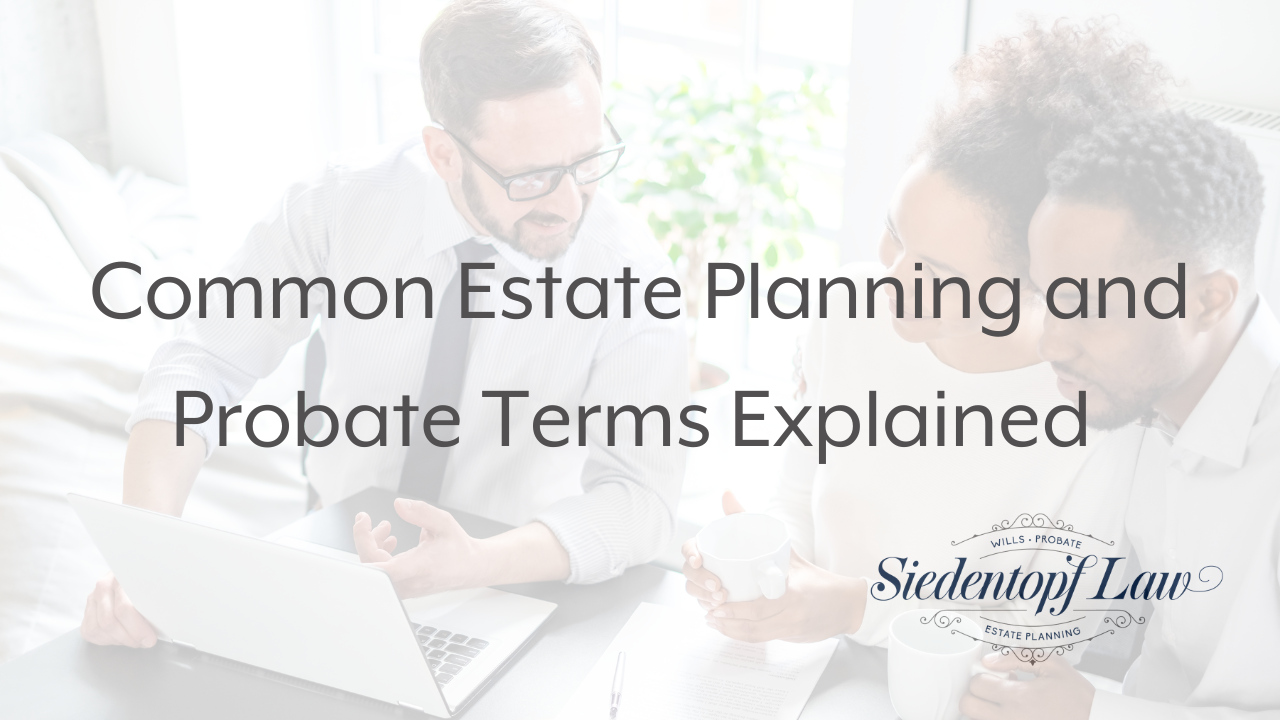Lawyers and the law can be known to use some fancy language, or perhaps better said, in the words of Gilbert Blythe of Anne of Green Gables, “highfalutin mumbo jumbo.” Our goal is to speak the everyday language all the time, especially when discussing your estate plan with you, but there are common estate planning and probate terms some we just can’t avoid using.
We’ve created a list of common estate planning and probate terms and will continue to add to it as other terms come up.
Advanced Healthcare Directive – Also known as a Healthcare Power of Attorney and Living Will, this is the document that outlines your wishes for end-of-life care and designates an agent to speak on your behalf should you be unable to.
Agent – Someone named in a legal document, such as a Power of Attorney or Advanced Healthcare Directive, given authority to act on behalf of another person.
Asset – any property you own. This can be cash, insurance policies, vehicles, or real estate to name a few. Anything you own is considered your asset.
Beneficiary – A beneficiary is an individual or entity named within a Will, Trust, insurance policy, or otherwise designated to receive monies, properties, or other assets owned by another.
Beneficiary Designation – This is a tool used in estate planning on certain accounts or insurance policies allowing the funds to pass directly to a beneficiary you designate to receive them.
Debt – Any monies you owe any party. Examples: mortgage, credit card debts, student loans, personal loans, etc.
Deed – A legal document transferring the title to property from one person or entity to another.
Estate – The sum of your assets and debts at the time of your death.
Executor – Also known as a Personal Representative, an executor is a person or entity named in an individual’s Will to execute their wishes for their estate after their death. This is why they are called the “executor”. They are executing the deceased’s wishes.
Fiduciary – Someone who is trusted to act on behalf of another’s best interest.
Grantor / Trustor – A person who sets up a Trust. Their property and/or assets are going into the Trust.
Guardian – a person or persons designated to care for minor children or adults with special needs upon incapacity or death.
Heir – a person legally entitled to another person’s assets or property upon their death.
Holographic Will – A handwritten Will.
Inheritance – items or assets received upon the death of another person.
Intestate – When a person dies without a valid Will.
Irrevocable Trust – A Trust that cannot be revoked or modified — even during the life of the grantor.
Next of Kin – your closest living relative or relatives. State of residency determines who next of kin are. In Georgia, the order is surviving spouse, children and descendants, parents, siblings, and grandparents.
Pour-Over Will – a Last Will and Testament that leaves everything in your estate to your Trust and asks the Court to send everything through Probate as quickly as possible.
Power of Attorney – A legal document that names an agent to act on your behalf during your lifetime.
Prenup / Prenuptial Agreement – A legal agreement entered into before a marriage outlining what happens to each spouse’s assets when certain events (such as divorce or death) occur.
Probate / Probating – The process of administering an estate of someone who died with or without a Will through the Court.
Residuary – a term used for assets that are not real estate, tangible personal property, or assets with beneficiary designations. This is essentially the junk drawer of your assets that don’t fit into any of those categories.
Revocable Trust – A Trust that can be changed or completely voided during the life of the grantor.
Settlement – An official agreement, usually with a monetary gain, that resolves a dispute.
Succession – The process of following another. In the estate planning world, this is the order in which people are deemed heirs by state law, named as beneficiaries or executors in a Will, etc.
Tangible Personal Property – property that you personally own and can hold, that can also be relocated.
Testator/Testatrix – A person executing a Will.
Trust – A legal agreement between two parties, where one gives the other the right to hold property or assets on behalf of a third party.
Trustee – A person who will manage a Trust. They have a duty to act in the best interests of the Grantor/Trustor and future beneficiaries of the Trust.
Will – A legal document outlining your wishes for what happens to your estate after death.
The experts at Siedentopf Law are here to make your estate plan easy for you. We can bring peace of mind to what can feel complicated and overwhelming. Schedule a consultation or call us today at (404) 736-6066 to discuss how we can help!








